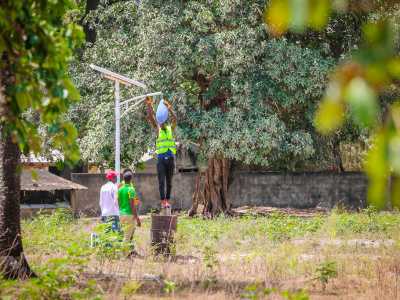
De-risking and Reconnecting: Europe, China and Africa in the green transition
On 15 December 2025, from 13:00 to 18:15 CET, ECDPM will host a hybrid event exploring how the EU and China are connected through their roles in Africa’s green transition and drawing lessons for future engagement. The discussion will examine how Europe can balance industrial competitiveness and strategic autonomy with global cooperation, consider African priorities in the green transition, and explore opportunities for more pragmatic and complementary collaboration between the EU, China, and developing countries to achieve shared green transition goals.
Background
Clean technologies and green energy are important for the EU's green transition and for the future-oriented sectors in which Europe aims to strengthen its economic position. Expanding partnerships with countries in Africa, Asia and Latin America is now essential to diversify the supply of critical raw materials, enhance the resilience of green energy supply chains and open new export markets for European industries.
At the same time, China’s dominance in green technologies – from batteries to solar and wind – and investments in other frontline technologies like hydrogen is seen as both a competitive challenge and a dependency risk in Europe. The EU has adopted a series of de-risking measures vis-a-vis China, as part of its broader open strategic autonomy and economic security agenda, for example tariffs on electric vehicles and the mobilisation of the foreign subsidy regulation for solar and wind. Yet, for Europe the path towards technological resilience remains long and complex.
China has put in place export controls and licensing on critical raw minerals and rare earths, as part of its economic statecraft and negotiating strategy in the trade tensions vis-a-vis the US. Its 15th Five-Year Plan Recommendations signal a stronger focus on high-quality industrial development, national security and a deepening of technological and scientific self-reliance, on the back of a more uncertain and complex global landscape.
Together, these movements suggest an entrenchment of national interests and geostrategic tensions between global powers. These bilateral tensions are often externalised in the relationships with the rest of the world where engagement of one global power with developing countries is seen as a way of countering the influence of another global power. Yet, Africa, Asia and Latin America want, first and foremost, to advance their own socioeconomic development and green transitions, and do not want to be instrumentalised by external agendas. To pursue these goals, they engage with multiple partners – including both the EU and China, among many others.
China has become a major partner in African development. Chinese companies are transforming Africa’s energy landscape, while Chinese early stage investments in mineral processing and green mobility also create opportunities for local value addition. The EU remains an important partner that aims to promote shared agendas and sustainable partnerships, with investments and development support across a range of sectors – from education to green energy. Despite frictions between Brussels and Beijing, European and Chinese firms are often involved in joint projects in African countries. Arrangements vary significantly, spanning from proper joint ventures to sub-contracting, from parallel financing to ESG services.
For the past two years, ECDPM has endeavored, through evidence-based policy analysis, to add more nuance in the EU policy debate about the role of China in African countries, and carefully highlight the implications for the EU. In particular, the focus has been on African perspectives on the EU and China’s respective contributions to their green transition, delving into concrete cases such as the Lobito Corridor, and identifying areas of complementarity or competition, for example on green skills.
Programme
13:00 – 13:30 Introduction
Welcoming remarks: San Bilal, ECDPM Director
Objectives of the day – Mariella Di Ciommo, Senior Policy Analyst, EU foreign and development policy, ECDPM
13:30 – 15:00 Session 1 – Europe’s green transition and external interdependencies
The discussion will examine how Europe’s efforts to reduce dependencies on China intersect with its broader green industrial and partnership strategies, and what this means for cooperation with Africa.
Moderator: Alfonso Medinilla, Head of climate and green transition, ECDPM - moderator
Cecilia Trasi, Senior Policy Advisor, Industry and Trade, ECCO Climate
Kudakwashe Manjonjo, Just Transition Advisor, Power Shift Africa
Jesper Friis, Head of Development Policy and Partnerships, Confederation of Danish Industry
Dr. Ceren Ergenc, Research Fellow, CEPS Comment end
15:00 – 15:30 Coffee Break
15:30 – 17:00 Session 2 – Partner countries’ green transitions and cooperation with the EU and China
The session will discuss how African countries are pursuing their own green transitions, and how Europe can better support their agendas while acknowledging China’s strong presence on the ground.
Moderator: Poorva Karkare, Senior Policy Analyst, African Economic Integration, ECDPM
Dr. Wei Shen, Resource Politics and Environmental Change Cluster Lead and Research Fellow, IDS
Carita Tissari da Costa, Manager International Business Innovations, Business Finland
Chema Triki, Managing Director, Growth Teams (TBC)
Pauline Veron, Policy Analyst, European Foreign and Development policy, ECDPM
17:00 – 17:15 Concluding Remarks
Nicoletta Pusterla - Deputy Head of Division, China, Hong Kong, Macau, Taiwan and Mongolia, European External Action Service, EEAS
17:15 – 18:15 Networking reception







